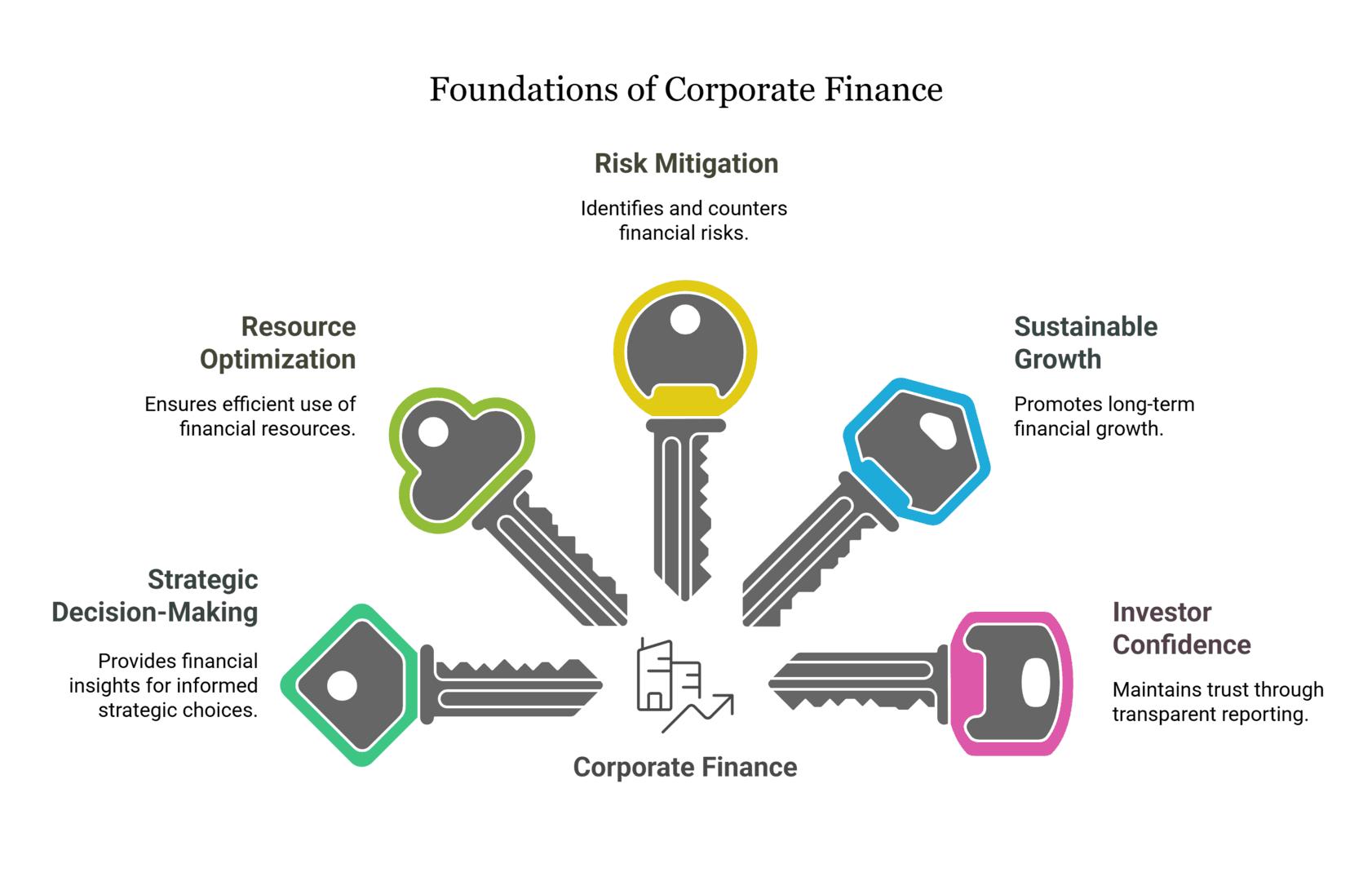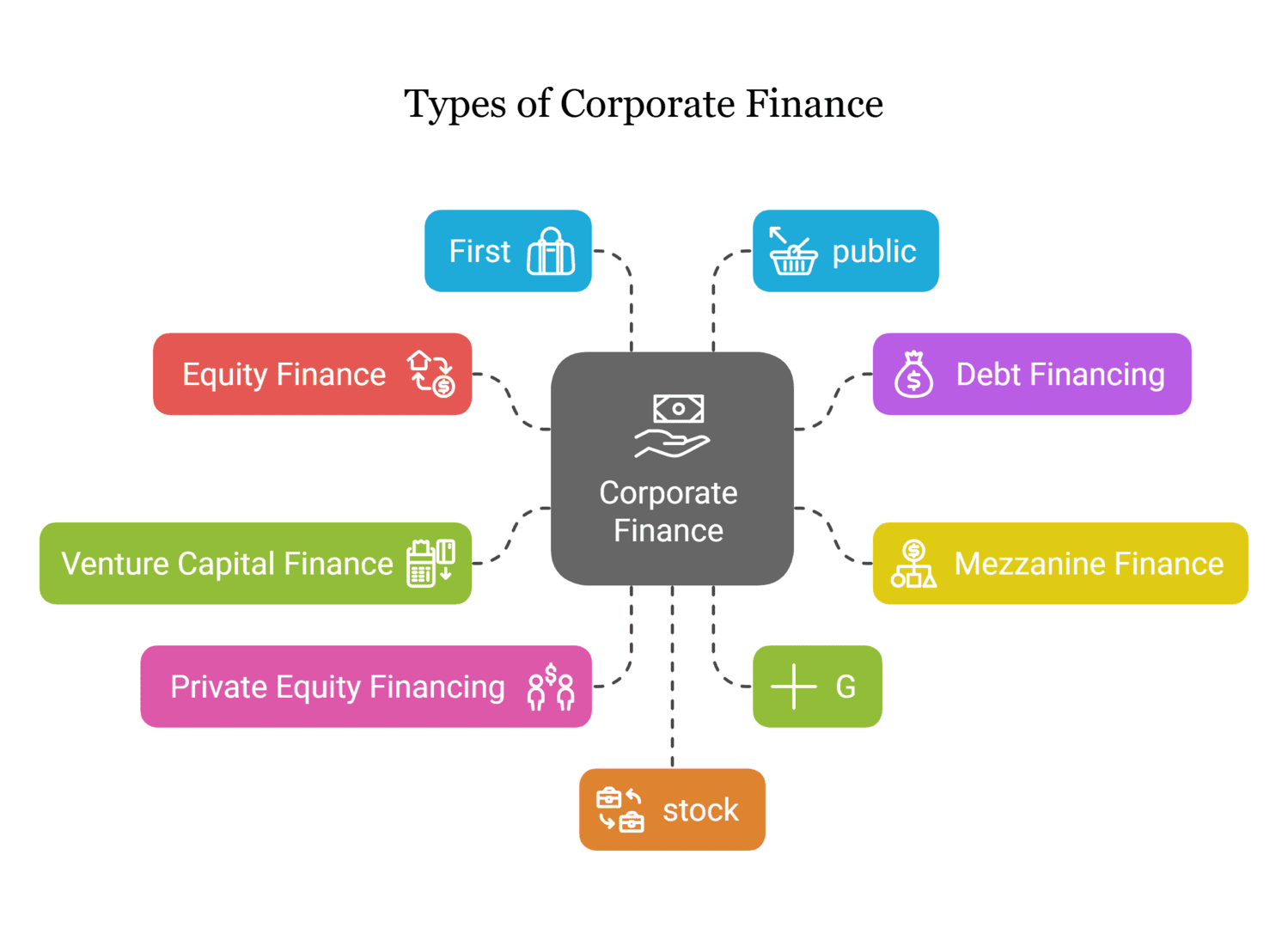What Is Corporate Finance? Scope, Importance, and Functions
Table of Contents

- jaro Education
- 30, January 2023
- 4:42 am
Corporate finance is a subdivision of finance that looks at how corporations handle capital structuring, sources of financing, investments, and accounting decisions. The objective of this subdivision is to maximize shareholder value while balancing risk with profitability. It involves long- and short-term financial planning and putting various strategies to use, capital investment, and tax factors.
Continue reading to uncover What is corporate finance? The scope of corporate finance, the importance of corporate finance, some guiding principles of it, as well as key areas of interest in the field.
What is Corporate Finance?
Corporate finance refers to the several methods a business leverages to raise capital to support its operations and invest in its future expansion. A wide number of operations fall under this category, including issuing stocks and bonds, borrowing money through loans, and generating capital through joint ventures and other types of strategic alliances.
Corporate financing plays a significant role in a business’s success. What is corporate finance? Overall financial management strategy. It entails carefully balancing the demand for money with the costs and risks of various financing choices.
Top Objectives of Corporate Finance Every Business Should Know
Commercial finance with the fiscal cycle, starting from budgeting and investing to planning and strategic planning. Indeed, the ultimate ideal is to pursue sustainable development for businesses that is salutary for the shareholders. Below are the main objects of commercial finance presented with applicability to the real world and their exemplifications of what corporate finance is.
- Maximizing Shareholder Value
The main ideal of commercial finance is to ameliorate the wealth of shareholders through boosting the value of their investments.
Example
Apple Inc. concentrates on high-performing products, stock buybacks, and regularly paying dividends, all the while trying to increase EPS and stock value to the benefit of shareholders.
- Effective Capital Allocation
Companies have to allocate their capital coffers to systems that give the maximum returns while they seek to achieve their strategic objectives.
Example
Amazon has a good portion of its profit allocated to exploration and development, as well as new logistics centers and cloud computing, opinions that prove to be high returns on investment.
- Risk Management
Corporate finance includes the recognition, assessment, and management of similar fiscal pitfalls as credit threat, market threat, and operational threat.
Illustration
When a transnational corporation is concerned with overseas profit, a transnational might use currency hedging to manage the exchange rate threat.
- Icing Liquidity
Proper operation of liquidity is a very important factor in managing short-term scores and smooth day-to-day working.
Illustration
A manufacturing company maintains a reserve of credit line and maintains working capital so that supplier and hand payments are made on time.
- Strategic Financial Planning
Long-term fiscal planning in an association harmonizes its fiscal objectives with overall business strategies as well as trends in the market.
Illustration
Acquiring a world-class player and investing in battery technology are part of Tesla’s long-term strategy. Strategic fiscal planning assists in these objectives by matching capital structure and fundraising with the growth phase.
Functions of Corporate Finance
Corporate finance includes several vital functions that help shape a company’s fiscal health, which justify What is corporate finance?
- Capital Budgeting
Investment systems whose returns are anticipated to be assessed and chosen. This entails a process whereby implicit expenditures and investments are analyzed to determine if they’re profitable as well as applicable to the company’s strategic objectives.
- Capital Structure operation
The establishment will need to figure out the optimal rate of debt and equity backing to use in backing operations and growth within the company. Such a balance has an impact on the company’s threat profile as well as its cost of capital.
- Working Capital Management
The operation of the company’s short-term assets and liabilities should impact liquidity, which is necessary to support day-to-day operations. This involves control over cash inflow, force, delinquent accounts, and outstanding accounts.
- Tip Policy expression
Companies face a decision regarding their profits: distribute them to shareholders as dividends or reinvest them back into the business. This decision significantly impacts investor satisfaction and the company’s ability to grow.
- Financial Risk Management
Market volatility, credit threats & functional pitfalls, and strategies in hedging, insurance, and diversification to minimize similar pitfalls.
Scope of Corporate Finance
The field of corporate finance is expansive and includes a variety of corporate finance tasks aimed at controlling a business’s fiscal coffers and attaining its fiscal objectives. Within the horizon of corporate finance, some important areas include
Financial Planning
It details the measures a business must take to attain its fiscal objectives. Setting fiscal objectives, prognosticating unborn fiscal performance, and determining the coffers necessary to meet those objectives are some examples of fiscal planning.
Investment
Corporate finance experts are in charge of finding and assessing investment possibilities that can drive business expansion and value creation. This could involve investing in cutting-edge ministry, technology, or R&D.
Backing
Within the lines of marketable backing experts is embedded the quality nurture of a source of capital that an establishment needs to back its operations and investments. This can be fulfilled in numerous ways, such as by issuing stocks and bonds, taking out loans, or raising capital through common gambles and other types of strategic alliances.
Risk Management
Financial threat operation is a pivotal element of corporate finance. Relating and assessing implicit pitfalls, similar to the threat of loan delinquency or the threat of changes in the value of a company’s means, as well as putting programs in place to reduce or manage those pitfalls, may be necessary to achieve this.
Fiscal analysis and decision-making
To make well-informed fiscal opinions, corporate finance professionals employ colorful tools and approaches, including fiscal analysis and modelling. Analysing fiscal statements, prognosticating unborn fiscal performance, and using fiscal propositions and ideas, including the time value of money, to inform opinions, are examples of what this might include.
Corporate Governance
Corporate finance experts are also important in ensuring a business follows ethical corporate governance principles. This could include determining the company’s strategic direction in collaboration with the board of directors, supervising the fiscal resource operation, and making sure the business complies with all applicable rules and regulations.
Importance of Corporate Finance
There are several reasons why corporate finance is important.

Strategic Decision-Making: Offers financial news that is critical in providing financial understanding to make informed strategic decisions for mergers, acquisitions, or capital investment.
Resource Optimization: Guarantees the company’s financial resources are used effectively and exploitations are maximized, and waste is reduced.
Risk Mitigation: Helps in detecting possible financial risks and establishing measures to counter them, protecting the company’s assets and earnings.
Sustainable Growth: Promotes long-term growth as its financial plan is linked to the strategic objectives and market potential of the company.
Investor Confidence: Keeps the investor and shareholder community informed and responsible in the reporting of financials.
Types of Corporate Finance
Here are the types of Corporate Financing:

- Equity Finance:
In this method of financing, ownership holdings in the company are sold to raise funds. These stakes can take the form of stocks or shares.
- Debt Financing:
It entails taking out loans from banks, financial organisations, or other lenders. At a later time, the business pays back the loan and interest.
- Mezzanine Finance:
It is a hybrid type of funding that combines aspects of both debt and equity financing. It often entails the issue of instruments that are senior to equity but junior to ordinary debt.
- Venture Capital Finance:
In this sort of financing, a business receives funding from venture capital firms in return for a share of the business.
- Private Equity Financing:
In this type of financing, private equity firms invest in a company in return for a share of the company’s ownership.
- Initial Public Offering (IPO):
When a privately owned company first issues shares of its stock to the general public, this sort of financing takes place.
- Secondary Offerings:
A firm that is already publicly listed will issue more shares of its stock to the general public in a secondary offering.
- Convertible Debt:
Under certain circumstances, this sort of debt can be converted into equity later.
- Leasing:
This method of finance includes a corporation renting equipment or other assets from a lender rather than purchasing them entirely.
- Grants and Subsidies:
In this sort of funding, a business receives money through a grant or subsidy from the government or another entity
So, these are the scope and types of corporate finance professionals. If you are interested in managing corporate finances, then get enrolled in one of the best business finance courses discussed below.
Best Institution Offering Corporate Finance Program
IIM Mumbai, formerly known as NITIE, was established in 1963 by the Government of India with the assistance of the United Nations Development Project (UNDP) through the International Labour Organization (ILO) and is one of the leading institutes for management education. This institute, a pioneer in industrial management, has been positioned 6th amongst management schools in India by the National Institutional Ranking Framework (NIRF) in 2024.
Programme Overview
In this dynamic landscape of finance, professionals must have an edge over new-age financial concepts, analytics, and strategy. Taking this into account, IIM Mumbai has meticulously designed an Executive Certificate Programme in Corporate & Strategic Finance for seasoned finance professionals as well as for aspiring financial leaders. This program aims to provide a profound understanding of key financial concepts and strategies, fundamental financial statements, fintech innovations, etc., by emphasizing experiential learning with hands-on exercises, case studies, interactive sessions, and much more. Gear up to transform your career trajectory and lead toward growth!

Eligibility Criteria
A minimum of 50% marks in any graduate degree or diploma (10+2+3) with at least two years of work experience in the industry or any other relevant field.
How Will Jaro Education Help You Lead Your Career?
As one of India’s leading edtech firms, Jaro Education is committed to helping professionals and students elevate their careers through industry-relevant programs and personalized career support. Whether you’re looking to transition into a new domain, upskill with a premium executive course, or choose the right higher education path, Jaro’s career guidance and counseling services are designed to empower every learner.
Why Choose Jaro Education?
- Expert-Led Counseling
Jaro’s dedicated career counselors help you assess your goals, strengths, and market demand to match you with the most suitable courses from top-tier universities and institutions, ensuring long-term career alignment.
- Customized Career Pathways
From IT and AI to finance, marketing, and healthcare, Jaro provides tailored recommendations that reflect your professional background and future ambitions.
- Guidance at Every Stage
No matter where you are in your career journey, Jaro Education provides targeted guidance and support to help you achieve your professional upskilling goals
Conclusion
Corporations must take into account a variety of aspects when making financial decisions because finance is an essential component of any firm. This is essential for a company’s growth. Therefore, you need substantial theoretical and practical knowledge of corporate finance if you’re a finance enthusiast looking to advance your career. You may learn corporate finance in-depth by enrolling in Jaro Education.
Frequently Asked Questions
Corporate finance refers to the area of finance concerned with how corporations manage their funding, capital structuring, and investment decisions. It focuses on maximizing shareholder value through long-term and short-term financial planning.
The key objectives include maximizing shareholder wealth, ensuring efficient capital allocation, maintaining liquidity, minimizing financial risk, and achieving optimal capital structure.
The primary functions include:
- Investment decision-making (capital budgeting)
- Financing decisions (raising funds)
- Dividend policy formulation
- Financial risk management
- Working capital management
Corporate finance helps companies make strategic financial decisions, grow sustainably, manage risks effectively, and achieve long-term profitability and stability.
Major types include:
- Equity financing
- Debt financing
- Venture capital
- Mergers & acquisitions financing
- Lease financing










1 thought on “What Is Corporate Finance? Scope, Importance, and Functions”
If you are looking for best PGDM program in GREATER NOIDA for best placement so must visit site pgdm in finance’